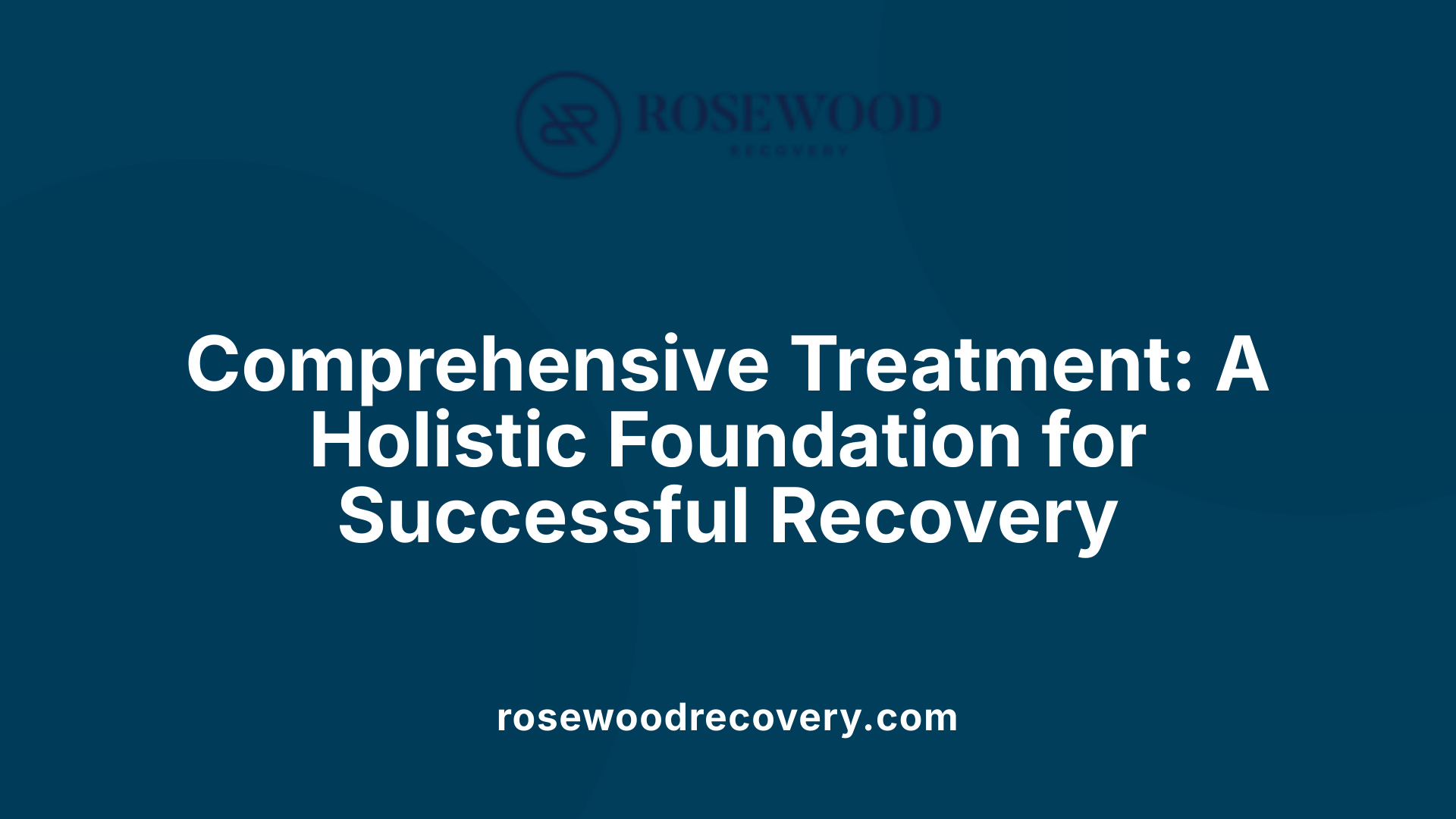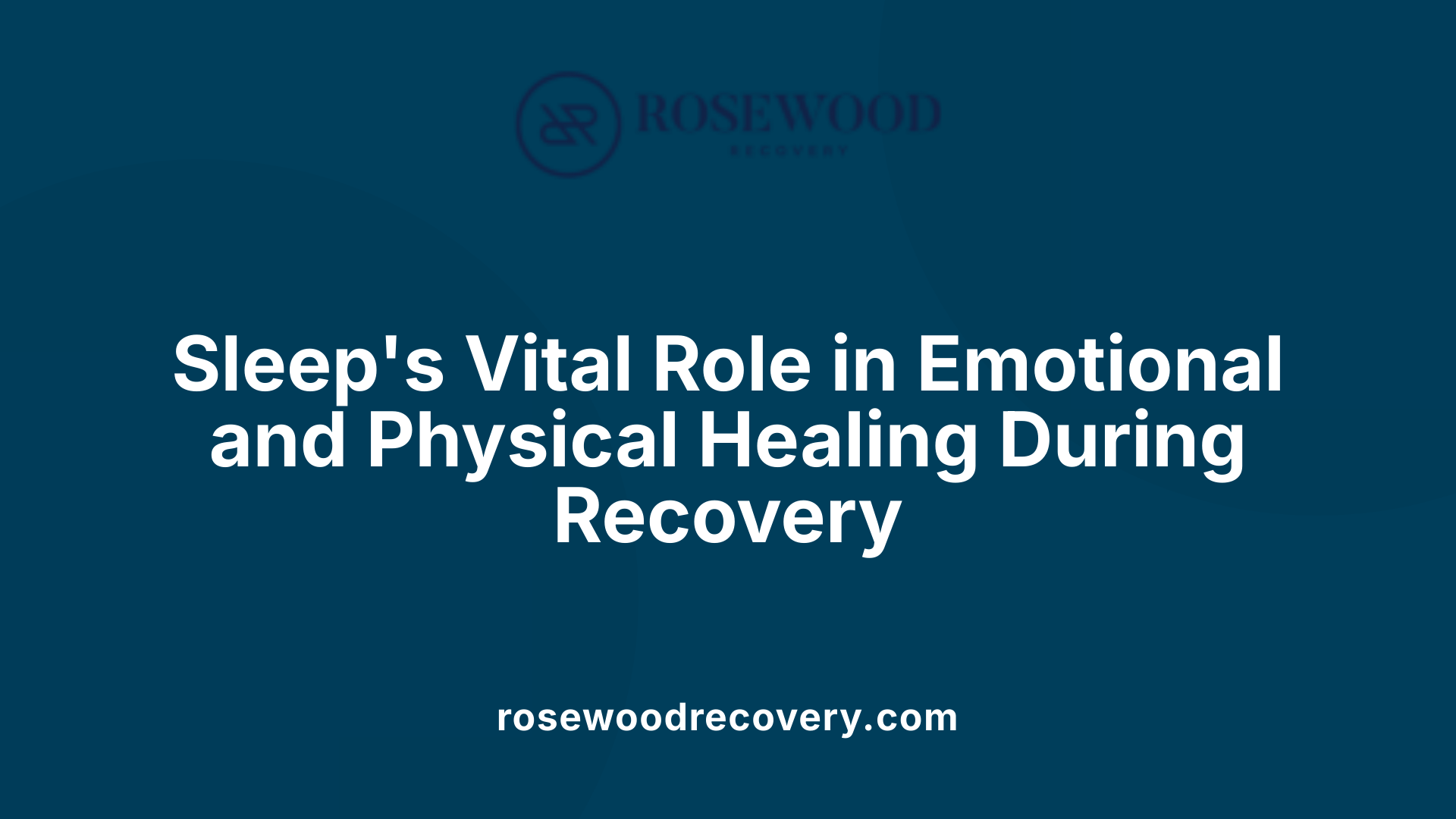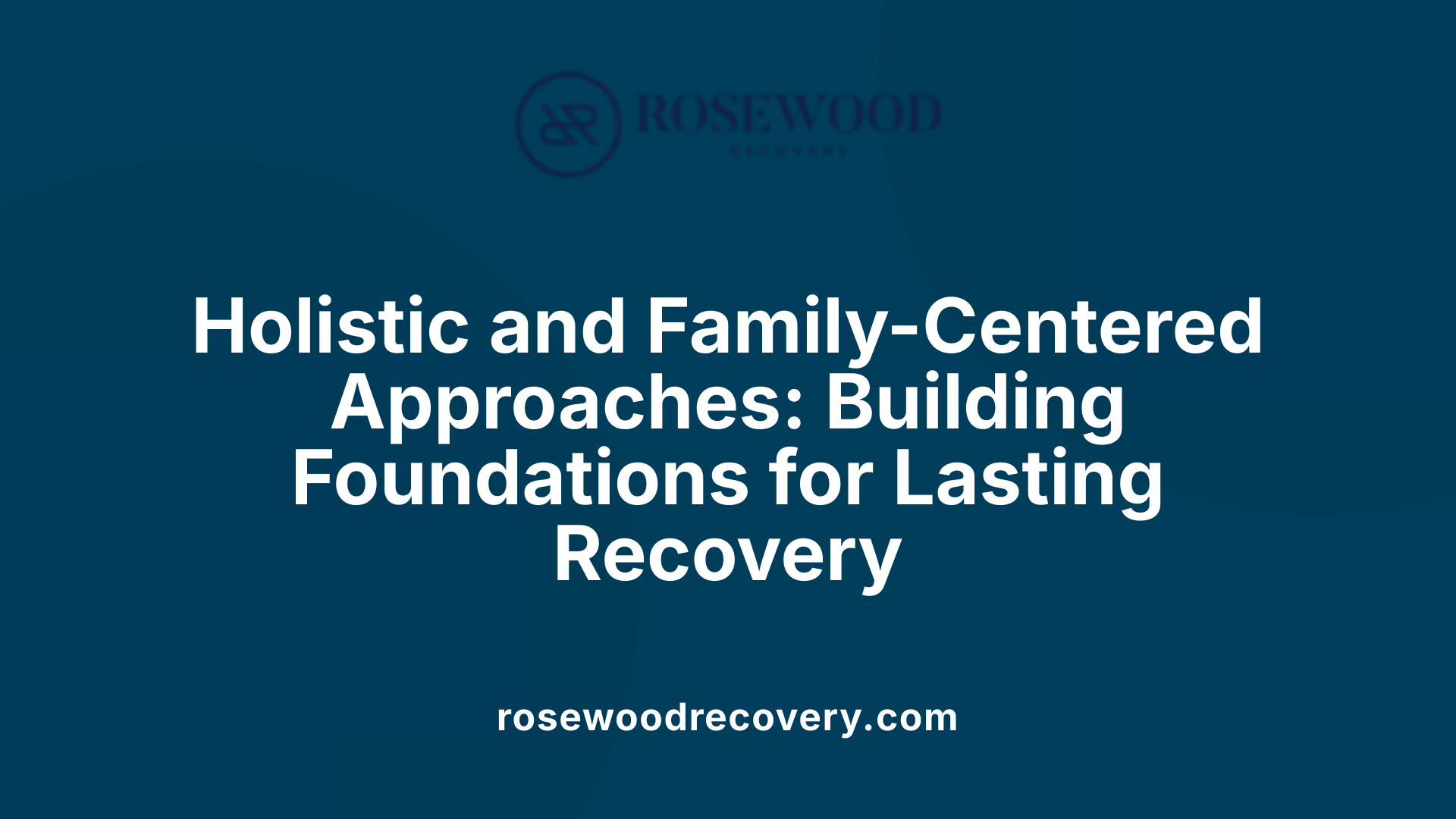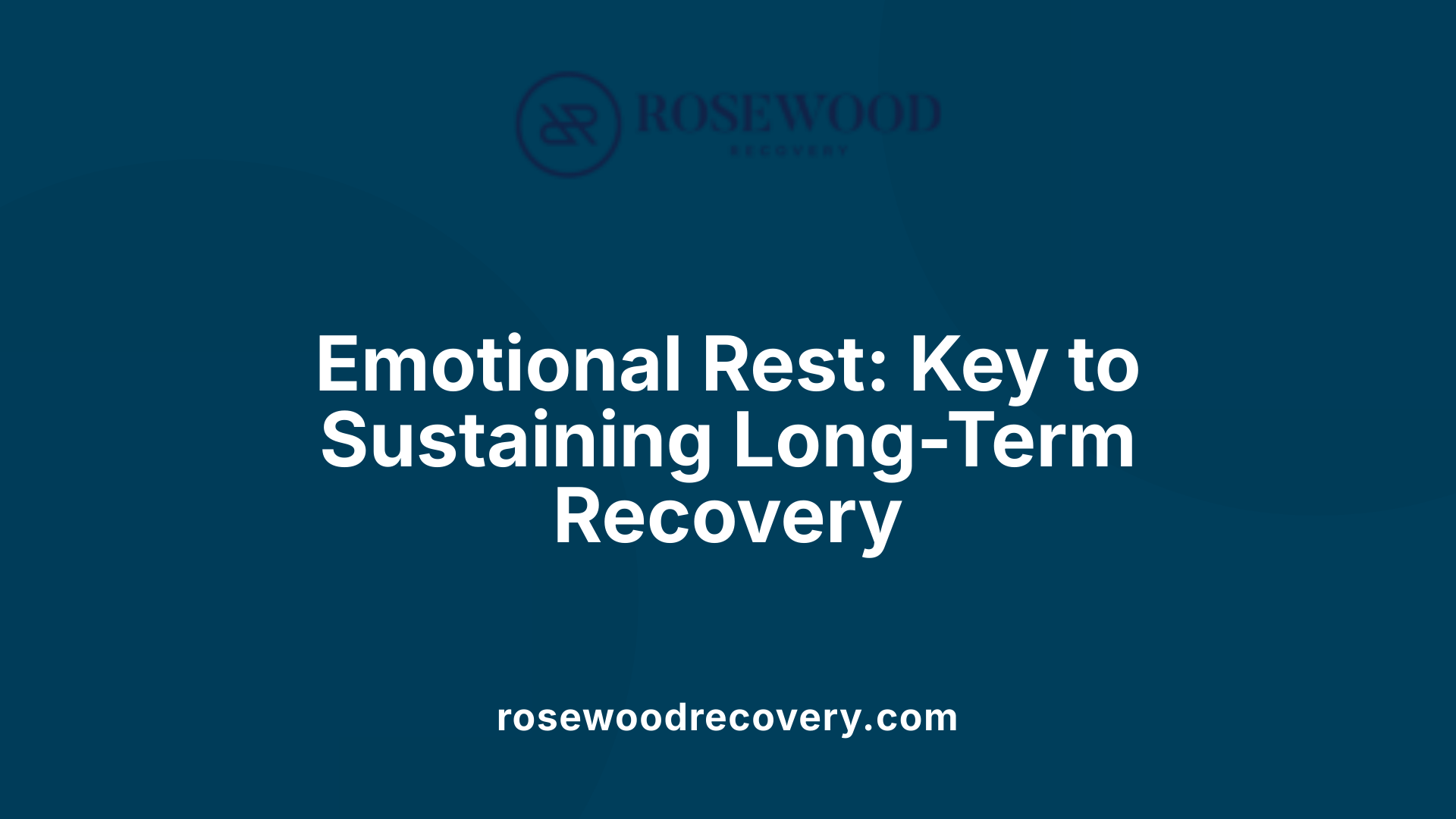Understanding Emotional Rest in Recovery
Emotional rest plays a crucial role in outpatient addiction programs, supporting individuals through the multifaceted challenges of substance abuse and co-occurring mental health issues. A balanced recovery journey demands more than physical detoxification; it calls for comprehensive strategies that nurture emotional regulation, mental well-being, and resilience. This article explores how emotional rest, integrated within personalized outpatient treatments, enhances long-term recovery success by addressing both addiction and mental health needs.
Comprehensive Treatment Services: A Holistic Foundation for Recovery

What comprehensive treatment services are available for substance abuse and mental health issues?
Comprehensive treatment services address the complex needs of individuals recovering from substance use and co-occurring mental health disorders. These services include medical detoxification, which manages withdrawal symptoms safely, as well as individual counseling to explore personal challenges and develop coping strategies.
Group therapy fosters connection and shared understanding among peers, while family therapy helps rebuild trust and improve communication within support networks. Medication management is integrated when appropriate to stabilize mood and treat underlying psychiatric conditions.
How are treatment plans personalized?
Treatment is tailored based on thorough professional assessments that consider symptoms, mental health history, substance use patterns, and personal goals. The duration of therapy varies; some individuals may benefit from short-term interventions, while others require longer-term support to maintain progress. This personalized approach ensures that each individual receives the most effective combination of services for their unique situation.
What is the role of integrated treatment?
Integrated programs simultaneously address substance use disorders alongside mental health challenges such as depression, anxiety, PTSD, or bipolar disorder. This dual-focus reduces negative emotional states that often trigger relapse, improving both stability and long-term outcomes. Approaches like Cognitive Behavioral Therapy (CBT) and Dialectical Behavior Therapy (DBT) are frequently employed to manage affective symptoms and support emotional regulation.
How do outpatient programs contribute to recovery?
Outpatient services offer flexible, ongoing care that supports individuals transitioning back to daily life. They include counseling, group sessions, and medication oversight while promoting healthy routines and coping skills. Such programs emphasize relapse prevention and stress management, ensuring consistent support without disrupting personal commitments. Community initiatives and peer support groups further enhance this network.
Which evidence-based therapies are effective?
CBT and DBT are cornerstone therapies that equip participants with lifelong skills for managing emotions, stress, and challenging thoughts. Motivational Interviewing helps build internal motivation for change. Additionally, mindfulness and acceptance-based therapies improve emotion regulation and reduce cravings. Combining these proven approaches within a comprehensive treatment plan strengthens resilience and fosters purposeful, sustained recovery.
Addressing Various Forms of Addiction Beyond Substance Abuse
How do treatment programs address various forms of addiction besides substance abuse?
Treatment programs for addiction extend their focus beyond substance abuse to include behavioral addictions like gambling, internet use, and eating disorders. These programs recognize shared vulnerabilities that affect both behavioral and substance addictions, such as difficulties with self-control, maladaptive thinking patterns, and limited social support.
To tackle these challenges, therapies like Cognitive Behavioral Therapy (CBT) are often adapted to suit the specific addiction type. CBT helps individuals identify and modify problematic thoughts and behaviors that fuel addictive actions. Motivational Enhancement Therapy and mindfulness-based interventions are also commonly used to boost motivation and emotional regulation.
Relapse prevention is a critical component across all types of addiction treatment. This includes teaching practical skills for managing triggers, reducing cravings, and developing healthier coping mechanisms. Support networks, including support groups and family involvement, help maintain recovery by reducing isolation and promoting accountability.
Transdiagnostic approaches are increasingly popular, targeting neurobiological and psychological factors common to addictions, regardless of whether they involve substances or behaviors. This integrated approach ensures personalized care plans that consider each individual's unique history, symptoms, and goals.
Overall, effective addiction treatment is comprehensive and flexible, addressing the root causes and sustaining long-term recovery through tailored therapies, ongoing support, and skill-building strategies.
The Role of Emotional Regulation and Affect in Recovery

How do negative and positive affect influence addiction?
Negative and positive emotions profoundly impact behaviors related to substance use. Negative affect, including feelings such as depression and anger, is often a strong trigger for relapse during substance use disorder (SUD) treatment. Individuals may misuse substances as a way to self-medicate emotional distress, which unfortunately worsens both their mental health and addiction problems. Conversely, improving positive affect through therapeutic means can bolster emotion regulation and strengthen resilience against relapse.
What role do depression and anger play in substance misuse?
Depression is a serious mental health condition marked by persistent negative mood, loss of interest, fatigue, and other symptoms that often coexist with addiction. People experiencing depression are more susceptible to substance misuse and have an increased suicide risk when depression and addiction co-occur. Anger, in its various forms—from passive aggression to outright hostility—is also linked to increased use of substances such as alcohol, marijuana, and cocaine. Both emotions can impair decision-making and coping skills, making recovery more challenging.
How does emotional dysregulation increase addiction risk?
Research shows that emotional dysregulation — the difficulty in managing and responding to emotional experiences — increases vulnerability to addiction. Long-term substance use further impairs the brain’s capacity to regulate emotions, creating a vicious cycle that complicates recovery efforts. Addressing emotional dysregulation is therefore essential for effective treatment and long-term sobriety.
Which therapies effectively target affect regulation?
Cognitive-Behavioral Therapy (CBT) and Dialectical Behavior Therapy (DBT) have demonstrated success in reducing negative affect such as depression and anxiety, providing patients with practical skills to manage their emotions. Third-wave behavioral therapies, including mindfulness-based approaches like Mindfulness-Based Relapse Prevention and Acceptance and Commitment Therapy (ACT), show promise in improving positive affect and emotional regulation. Integrated treatments that simultaneously address co-occurring affective disorders and substance use also enhance treatment outcomes.
How do emotional symptoms influence treatment outcomes?
Baseline emotional symptoms—such as depression and anxiety—can predict the success of addiction treatments, underscoring the importance of personalized approaches. Emotional distress and negative affect are associated with higher relapse rates and treatment drop-out. Studies from specialized programs emphasize that providing comprehensive emotional support during detox and ongoing treatment can increase completion rates significantly and contribute to lasting recovery.
| Aspect | Impact on Addiction Recovery | Therapeutic Focus |
|---|---|---|
| Negative Affect | Triggers relapse and substance misuse | CBT, DBT, mindfulness therapies |
| Depression | Increases risk of substance misuse and suicide | Integrated dual-diagnosis treatment |
| Anger | Linked to increased substance use | Emotion regulation training, DBT |
| Emotional Dysregulation | Heightens addiction risk, impairs recovery | Mindfulness, acceptance therapies |
| Treatment Outcomes | Influenced by affective symptoms; predicts success | Personalized treatment planning, emotional support |
Evidence-Based Therapies Enhancing Emotional Rest
What is Cognitive Behavioral Therapy (CBT) and how does it help?
CBT is a practical therapy that helps individuals identify and change negative thought patterns and behaviors. In addiction recovery, CBT reduces symptoms of depression, anxiety, and negative emotions that often trigger relapse. By building coping strategies and problem-solving skills, individuals learn to manage stress and emotional challenges effectively.
How does Dialectical Behavior Therapy (DBT) support emotional regulation?
DBT focuses on teaching skills like mindfulness, distress tolerance, emotion regulation, and interpersonal effectiveness. It is especially valuable for people struggling with intense emotions and impulsivity often linked to addiction. DBT helps reduce emotional dysregulation, which is a major relapse risk factor, by providing tools to manage cravings and difficult feelings.
What role do mindfulness-based and acceptance therapies play?
Third-wave therapies such as Mindfulness-Based Relapse Prevention (MBRP) and Acceptance and Commitment Therapy (ACT) cultivate awareness and acceptance of thoughts and emotions without judgment. These approaches improve positive affect and emotion regulation, making them promising for treating co-occurring substance use and mental health conditions.
How are these therapies integrated in outpatient treatment?
In outpatient settings, therapies like CBT, DBT, and mindfulness-based techniques are combined with counseling, medication management, and peer support. This integration addresses the individual's unique symptoms and goals, providing continuous emotional support and tools for managing stress and cravings.
How does skill-building in these therapies enhance emotional management?
These treatments focus on developing lifelong skills to manage emotions, reduce negative affect, and prevent relapse. Through individual sessions, group therapy, and skill training, individuals gain practical strategies to maintain emotional stability, build resilience, and foster lasting recovery success.
| Therapy Type | Focus Areas | Benefits in Recovery |
|---|---|---|
| Cognitive Behavioral Therapy | Restructuring thoughts and behaviors | Reduces depression and anxiety; improves coping |
| Dialectical Behavior Therapy | Mindfulness, emotion regulation, distress tolerance | Manages impulsivity; reduces emotional dysregulation |
| Mindfulness-Based Therapies | Acceptance, present-moment awareness | Enhances positive emotions; supports relapse prevention |
| Integrated Outpatient Therapy | Combination of therapies with medication and support | Personalized care; continuous emotional support |
The Importance of Sleep for Emotional and Physical Recovery

Sleep’s Role in Cognitive Function and Emotional Regulation
Sleep is fundamental to maintaining cognitive functions such as memory, problem-solving, decision-making, and creativity. These abilities are vital during rehabilitation as they help individuals absorb therapy and process emotions effectively. Beyond cognition, adequate sleep also stabilizes mood and reduces symptoms of anxiety and depression, aiding emotional regulation during recovery.
Benefits During Addiction Treatment
Quality sleep supports physical healing by promoting tissue repair and boosting immune function. In addiction treatment, it acts as a natural stress reliever by lowering cortisol levels and helps maintain concentration and focus, which are essential for active participation in therapy and recovery activities.
Effects on Cravings and Relapse Prevention
Getting enough restorative sleep reduces the intensity of cravings, making it easier to resist substance use. It also enhances decision-making skills and impulse control, both critical for preventing relapse. Consistent sleep fosters emotional resilience and improved stress management, increasing the likelihood of sustained recovery.
Strategies to Improve Sleep Hygiene
Establishing a healthy and consistent sleep schedule is foundational. Techniques such as relaxation exercises, stress management, and creating a conducive sleep environment enhance sleep quality. Incorporating these strategies helps individuals build healthy routines that support lasting recovery.
Link Between Sleep and Immune Function
Sleep enhances the immune system, which is particularly important during recovery from substance abuse. A strong immune system supports the body's ability to heal and recover, reducing vulnerability to illness and aiding overall well-being.
| Aspect | Impact on Recovery | Practical Implications |
|---|---|---|
| Cognitive Function | Enhances memory, decision-making, creativity | Improves therapy outcomes |
| Emotional Regulation | Reduces anxiety, depression, mood swings | Supports emotional stability |
| Physical Healing | Boosts immune system, tissue repair | Speeds recovery, reduces relapse risk |
| Craving and Impulse Control | Lowers craving intensity, improves self-control | Prevents relapse |
| Sleep Hygiene Strategies | Consistent schedule, relaxation techniques | Builds healthy habits, sustains long-term recovery |
Peer Support and Group Therapy as Pillars of Emotional Rest
Benefits of group therapy and peer groups
Group therapy and peer support groups offer unique benefits that complement individual counseling. They provide a space where individuals can share experiences, gain insights, and develop coping skills in a communal setting.
Reducing loneliness and fostering connection
Many people struggling with addiction and mental health challenges often feel isolated. Group settings reduce this loneliness by creating a sense of belonging and understanding among participants facing similar struggles.
Mutual support and accountability
These groups encourage participants to support one another through shared challenges and successes. This mutual support fosters accountability, motivating individuals to stay committed to their recovery journey.
Role in long-term recovery and emotional resilience
Sustained participation in group therapy builds emotional resilience by teaching practical strategies for managing difficult emotions and stress. This ongoing emotional support plays a crucial role in preventing relapse and maintaining sobriety over the long term.
Supplementing individual therapy
While individual therapy addresses personalized treatment goals, group therapy enhances these efforts by exposing individuals to diverse perspectives and collective wisdom. Together, they form a comprehensive approach to mental health and addiction recovery.
Integrating Holistic and Family-Centered Approaches

What holistic practices support emotional stability and recovery?
Holistic practices such as mindfulness, yoga, and meditation are widely recognized for their effectiveness in managing emotions and cravings during addiction recovery. These activities promote relaxation, reduce stress, and improve emotional regulation, helping individuals maintain sobriety and foster mental well-being.
How does family therapy contribute to recovery?
Family therapy plays a critical role in outpatient addiction programs by helping to rebuild trust and improve communication among family members. By addressing family dynamics, it supports ongoing recovery and creates a supportive home environment, which can significantly reduce the risk of relapse.
Why is emotional stability important in reducing relapse?
Emotional distress and negative affect often trigger relapse in substance use disorders. Holistic therapies combined with family involvement provide emotional support that stabilizes mood, enhances coping skills, and lowers the chances of falling back into substance use.
What role do healthy routines play in outpatient addiction care?
Establishing healthy daily routines like consistent sleep schedules, regular exercise, and structured therapy sessions is foundational in outpatient settings. These routines increase motivation, improve physical and mental health, and anchor individuals firmly in their recovery journey.
How does combining medical care and counseling benefit recovery?
A comprehensive approach combining medical treatments with counseling and holistic practices addresses both the physical and emotional aspects of addiction. This integrated care model ensures personalized support tailored to each individual's unique needs, leading to more stable and lasting recovery outcomes.
Sustaining Emotional Rest Through Personalized and Ongoing Support
How is the duration of mental health treatment tailored to individuals?
The length of mental health treatment varies based on individual needs. Some individuals benefit from short-term therapy focusing on immediate recovery goals, while others require longer-term support to manage complex issues or co-occurring disorders. This personalized approach ensures that the care matches the person's unique symptoms, history, and recovery objectives.
Why is addressing co-occurring disorders important in treatment?
Many people recovering from addiction also experience mental health disorders such as depression, anxiety, or PTSD. Integrated treatments that simultaneously address both substance use and these co-occurring affective disorders lead to more stable and lasting recovery outcomes. By reducing negative emotions like depression and anxiety, these approaches help decrease relapse risk and improve overall well-being.
How does ongoing mental health support act as a safety net during recovery?
Consistent support throughout recovery is crucial. Ongoing mental health care helps individuals manage setbacks and prevents relapse by providing a safety net during vulnerable times. This may include regular counseling, medication management, group therapy, or peer support, all aimed at maintaining emotional stability and encouraging resilience.
What role do coping skills and resilience play in sustaining recovery?
Therapies such as Cognitive Behavioral Therapy (CBT) and Dialectical Behavior Therapy (DBT) equip individuals with practical skills to handle stress, regulate emotions, and challenge unhelpful thoughts. These lifelong coping skills empower individuals to respond effectively to cravings and emotional triggers, fostering resilience and a purpose-filled life.
Why are professional and community resources vital for comprehensive support?
A combination of professional therapy and community resources like support groups, family therapy, and holistic practices offers a robust network of care. Group settings reduce loneliness and offer mutual encouragement, while family involvement helps rebuild trust and communication. Together, these resources create a supportive environment crucial for sustained emotional rest and successful recovery.
The Impact of Emotional Rest on Long-Term Recovery Outcomes

Reducing relapse risk through emotional regulation
Emotional rest plays a vital role in helping individuals regulate difficult feelings, such as anger, depression, and anxiety, that often trigger relapse in addiction recovery. Therapies like Cognitive Behavioral Therapy (CBT) and Dialectical Behavior Therapy (DBT) teach practical skills to manage these emotions, reducing negative affect that frequently precipitates substance use. Proper emotional rest allows the brain to recover, improving resilience against cravings and emotional distress.
Enhanced decision-making and impulse control
A well-rested mind is better able to make thoughtful decisions and control impulses. Sleep and emotional rest stabilize brain function, aiding focus and concentration. This improvement supports resisting immediate urges and making long-term choices aligned with recovery goals, essential for relapse prevention.
Stabilizing mood and reducing anxiety
Emotional rest contributes to mood stabilization by lowering irritability and symptoms of anxiety and depression, common co-occurring conditions with substance use disorders. Reduced cortisol levels and balanced neurotransmitter activity foster a calmer mental state, facilitating healthier emotional responses during recovery.
Boosting motivation and participation in recovery activities
When emotional rest is prioritized, individuals experience increased energy and motivation, encouraging active involvement in therapy sessions, support groups, and healthy lifestyle activities. Higher participation supports therapeutic gains and reinforces recovery efforts.
Establishing sustainable recovery habits
Consistent emotional and physical rest helps establish healthy daily routines, which are foundational for lasting recovery. These stable habits promote ongoing stress management, better sleep quality, and overall well-being, supporting long-term emotional resilience and reducing the likelihood of relapse.
Embracing Emotional Rest for Holistic Recovery Success
Incorporating emotional rest into outpatient programs not only supports mental health but also profoundly influences recovery durability. By intertwining evidence-based therapies, quality sleep, peer support, and holistic strategies, treatment programs can address the complex emotional landscape of addiction and mental health challenges. Personalized, integrated care that prioritizes emotional regulation and rest empowers individuals to navigate recovery with greater resilience and purpose. Ultimately, emotional rest emerges as a foundational component, enhancing overall well-being and fostering sustainable sobriety in outpatient settings.
References
- The Importance of Mental Health During Addiction Recovery
- Substance Abuse Rehab and sleep: The amazing benefits of ...
- The Role of Affect in Psychosocial Treatments for ...
- The Role of Emotions in Recovery and Treatment
- The Crucial Role of Emotional Support During Drug Detox
- The Link Between Sleep and Recovery
- The Importance of Mental Health in Recovery
- Home | SAMHSA - Substance Abuse and Mental Health ...
- FindTreatment.gov: Home

.jpeg)
.jpeg)

